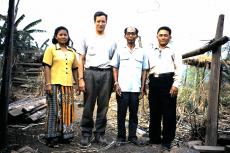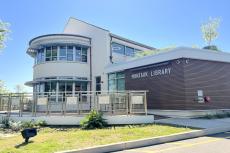As it was expected to do, the East Hampton Town Board adopted the town's 2021 budget last Thursday, along with a number of resolutions aimed at projects to improve water quality in Montauk. The board also appointed members to new committees and an advisory group and scheduled a public hearing on outdoor dining legislation for next Thursday.
The 2021 budget, which at $82.68 million represents a less than 1 percent spending increase over the 2020 budget, stays under the state tax levy cap by about $9,000, Len Bernard, the town's budget officer, told the board during a Nov. 5 public hearing. The tax rate outside villages will go up by 2.57 percent, and decrease inside an incorporated village by .15 percent. The increase outside villages is largely a result of Suffolk County's $500,000 reduction in the town's public safety grant, which county officials said would be in effect for one year.
The budget adds four new full-time positions: an ordinance inspector, an environmental analyst, an information technology specialist, and a harbormaster. It also recognizes the performance of town employees with regrades to a higher level, merit and title increases, promotions, and raises. The budget "uses a reasonable amount of surplus to help pay some Covid-related expenses we anticipate," Mr. Bernard said during the public hearing. It is "an honest, conservative budget," he said, that takes into account the effects of the coronavirus pandemic on revenue and spending.
On the recommendation of the Natural Resources Department, the board voted to accept a proposal from H2M architects + engineers of Melville for engineering services toward the creation of a wastewater management district for downtown Montauk. The board has long considered an advanced, centralized wastewater treatment system for the downtown area, comprising around 200 properties, where many commercial properties' septic systems are defined as "nonfunctioning." A large majority of those properties do not have adequate space to replace a failing system with a state-of-the-art, low-nitrogen septic system, as their structures occupy most of the lot.
Improving the downtown's wastewater treatment is urgent in order to limit the release of pollutants that could affect ground and surface waters, including Fort Pond, which has experienced harmful algal blooms. "We need a centralized community system," Laura Tooman, president of Concerned Citizens of Montauk, told the board during remarks in support of its resolutions related to the hamlet. H2M is "the right team" to "help us advance where we need to be in downtown," she said.
The board also voted to retain PW Grosser Consulting of Bohemia for a $25,470 project to install permeable pavement at the parking area at the end of South Lake Drive, along with rain gardens and other revitalization of the site to capture and treat road runoff, and D&B Engineers and Architects of Woodbury for permeable pavement at the town dock at Star Island and the boat ramp on West Lake Drive, which is to improve drainage, and vegetative swales at West Lake Drive's intersections with Flamingo Avenue and Star Island Road. The combined cost is $145,820.
The board also voted, on the recommendation of the water quality technical advisory committee, to direct $48,570.70 from the community preservation fund to the purchase of a pumpout boat for the town trustees, who operate boats in Lake Montauk and Three Mile Harbor. The allocation supplements a $60,000 grant awarded to the Ótrustees through the New York State Environmental Facilities Corporation's Clean Vessel Act Assistance Program. The trustees, who estimated a tripling in boating activities in 2020, have said that a third pumpout boat was urgently needed.
Preliminary results of a C.C.O.M.-funded microbial source tracking study of Lake Montauk, Ms. Tooman told the board, indicate that human waste is a significant source of bacteria in that water body and was likely a result of discharge of sewage, which under federal law is illegal in waters within three miles of land. The town, "by taking this next step to fund the trustees for another boat, will help this issue," she said.
The board, which adopted legislation enabling a community choice aggregation program on Nov. 5, appointed an advisory group charged with developing and reviewing proposals, acting as the town's agent in awarding said proposals, and forwarding information regarding such awards to the board for ratification. Community choice aggregation, or C.C.A., allows a local government to procure electricity and/or natural gas on behalf of its residents, businesses, and municipal accounts from a provider other than the incumbent utility. Power supply purchase options include power produced through 100-percent renewable sources, power produced through nonrenewable sources, or a blend.
The board also appointed members to new committees tasked with police reform and wireless communications.
The board scheduled a public hearing next Thursday on a pilot program for outdoor dining. The proposed legislation has been drafted over the last few months in an effort to allow restaurants to remain viable throughout the coronavirus pandemic. It would be implemented as a special permit process, transferring indoor use outdoors with tight parameters to ensure no expansion of use and to safeguard the quiet enjoyment of residential property owners. The pilot program would expire in December 2021 unless extended or incorporated as a permanent special permit.
The board's meeting next Thursday will start at 2 p.m.



